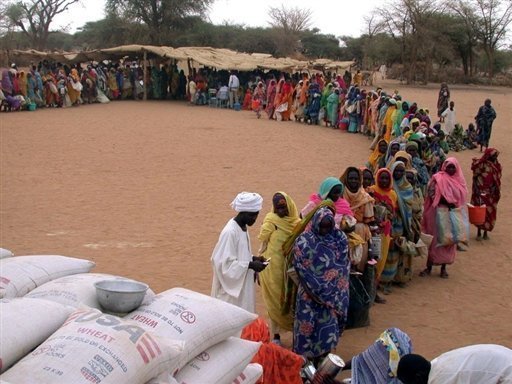
"Last year saw a surge in violence in southern Sudan. This could escalate even further and become one of the biggest emergencies in Africa in 2010," she added.
In 2009, some 2,500 people were killed and 350,000 fled their homes, a higher death toll than occurred in war-torn Darfur in the same period.
The agencies said the rest of the world had largely overlooked the suffering.
Communities said women and children have increasingly been targeted in attacks and the government of Southern Sudan and international peacekeepers had been powerless to protect them.
The peace agreement was struck between the Sudanese government and the Sudan People's Liberation Movement, ending a two-decade civil war which cost two million lives.
The report said the next 12 months would see a number of potential flashpoints, including the first multi-party elections in 24 years and a referendum in which southerners would vote on whether to remain united with the north or to secede and become independent.
The aid agencies urged the UN Security Council to ensure that protecting civilians becomes a priority for the UN peacekeeping force, UNMIS, at this crucial juncture.
Growing frustration over the lack of development in southern Sudan was hampering the chances of peace, they warned.
Less than half the population has access to clean water and maternal mortality rates are among the worst in the world. Aid distribution is held back by the lack of proper roads in southern Sudan, an area the size of France.
One in seven children die before they are five and 80 percent of adults are illiterate.
Francisco Roque, of Save the Children in South Sudan, said the region remained one of the poorest on earth.
"People hoped the peace would bring economic benefits and development, but this has happened far too slowly and in some areas not at all."
Paul Valentin, International Director of Christian Aid, said sustained diplomatic efforts from the international community were desperately required.
"This helped achieve what many thought was impossible and secure the peace agreement in the first place. Now engagement is needed again to ensure all that effort does not go to waste."
Britain's Minister for Africa, Glenys Kinnock, who will visit Sudan from Sunday, insisted there was still time to avert a new conflict.
"I certainly would not say that conflict is inevitable. There is still time and we do understand what needs to be done," she told journalists.
Kinnock said she would put pressure on the leadership in Khartoum and the south of the country to engage urgently in dialogue, backed by "concerted, coordinated, targets efforts" from the international community.
"Such has been the terrible suffering and misery of the people of Sudan, it is actually time now that real pressure was put on to make sure that all sides come together in the interests of peace and stability."
Britain announced a 54 million pound (60 million euro, 86 million dollar) aid package for Sudan on Wednesday, of which 36 million pounds will go into an international humanitarian fund.
-----------------------------------------------------------------------------------------
In 2009, some 2,500 people were killed and 350,000 fled their homes, a higher death toll than occurred in war-torn Darfur in the same period.
The agencies said the rest of the world had largely overlooked the suffering.
Communities said women and children have increasingly been targeted in attacks and the government of Southern Sudan and international peacekeepers had been powerless to protect them.
The peace agreement was struck between the Sudanese government and the Sudan People's Liberation Movement, ending a two-decade civil war which cost two million lives.
The report said the next 12 months would see a number of potential flashpoints, including the first multi-party elections in 24 years and a referendum in which southerners would vote on whether to remain united with the north or to secede and become independent.
The aid agencies urged the UN Security Council to ensure that protecting civilians becomes a priority for the UN peacekeeping force, UNMIS, at this crucial juncture.
Growing frustration over the lack of development in southern Sudan was hampering the chances of peace, they warned.
Less than half the population has access to clean water and maternal mortality rates are among the worst in the world. Aid distribution is held back by the lack of proper roads in southern Sudan, an area the size of France.
One in seven children die before they are five and 80 percent of adults are illiterate.
Francisco Roque, of Save the Children in South Sudan, said the region remained one of the poorest on earth.
"People hoped the peace would bring economic benefits and development, but this has happened far too slowly and in some areas not at all."
Paul Valentin, International Director of Christian Aid, said sustained diplomatic efforts from the international community were desperately required.
"This helped achieve what many thought was impossible and secure the peace agreement in the first place. Now engagement is needed again to ensure all that effort does not go to waste."
Britain's Minister for Africa, Glenys Kinnock, who will visit Sudan from Sunday, insisted there was still time to avert a new conflict.
"I certainly would not say that conflict is inevitable. There is still time and we do understand what needs to be done," she told journalists.
Kinnock said she would put pressure on the leadership in Khartoum and the south of the country to engage urgently in dialogue, backed by "concerted, coordinated, targets efforts" from the international community.
"Such has been the terrible suffering and misery of the people of Sudan, it is actually time now that real pressure was put on to make sure that all sides come together in the interests of peace and stability."
Britain announced a 54 million pound (60 million euro, 86 million dollar) aid package for Sudan on Wednesday, of which 36 million pounds will go into an international humanitarian fund.
-----------------------------------------------------------------------------------------









 Home
Home Politics
Politics









